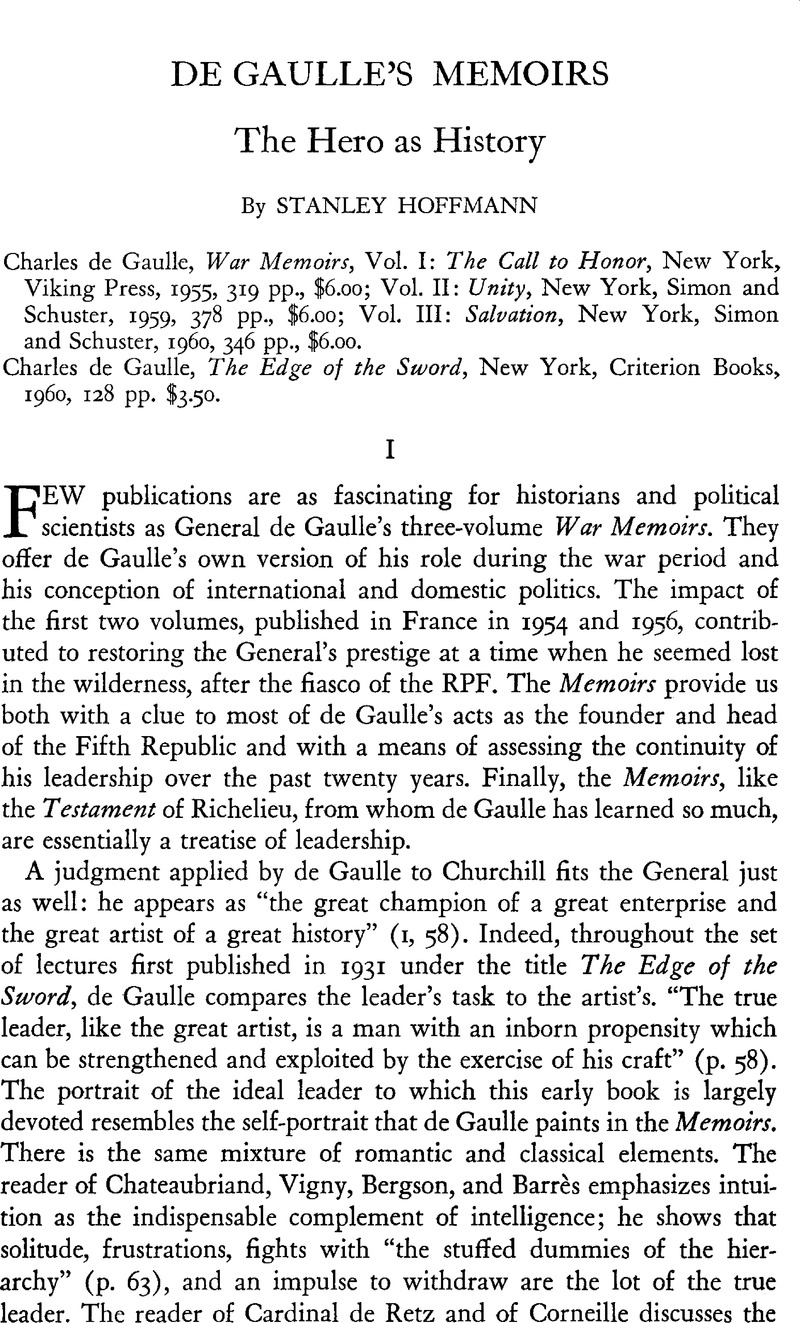Published online by Cambridge University Press: 18 July 2011

1 Only Vol. I of the American translation was published in an edition which presents those documents, under separate cover, along with the narrative text. My references to the documents in this article are taken from the French edition (Gaulle, Charles de, Mémoires de Guerre, Paris, Plon, Vol. I: L'Appel, 1954Google Scholar; Vol. II: L'Unité, 1956; Vol. III: Le Salut, 1959).
2 A long and moving letter sent by de Gaulle to Roosevelt in October 1942 tried to explain the difference between personal or partisan politics and the politics of Free France. This forceful document was left unanswered. The reader may find it in Vol. II of the French edition, pp. 382–85.
3 He condemns Hitler not only because Hitler attacked France, but also because “he based his colossal plan on the strength he attributed to man's baseness. Yet men are made of souls as much as of clay” (III, 198). Similarly, Laval's sin was “to approach matters by their underside” (II, 335).
4 De Gaulle once defined France as both “intégrée à l'Europe” and “étendue sur le monde entier” (II, 516, French edn.).
5 Translated as “the higher rationality of Europe” (III, 179)!
6 For instance: in 1940–1942, in order to get the French to resist Vichy, he repeatedly stressed that they all were resisting—and since they were, why should France's allies still deal with Vichy instead of with Free France alone? In 1958, in order to get French settlers in Algeria to change their traditional attitudes, he “understood them” to have, on May 13, 1958, expressed their desire to give equal rights to the Moslems.
7 “Se rétablir … sous des formes nouvelles” (I, 342, French edn.).
8 Thus grandeur does not depend on a colonial empire: what should be avoided is both that colonies “cut themselves off” from France, and that French forces get bogged down there (III, 253—the translation is bad). This is a crucial clue to his policies since 1958.
9 De Gaulle had committed himself not to fight “against France”; but Vichy, in his eyes, was not France: Vichy was the gravedigger of France's independence, status, and self-respect (I, 95; III, 283–86).
10 Anne McCormick's remark (III, 659, French edn.).
11 The Fourth Republic merely fumbled with grandeur, and it had popular support. Vichy, he thought, betrayed France's interests—hence de Gaulle's revolt.
12 This whole passage is inadequately translated.
13 However, he confesses to being fascinated by Assemblies, as was Barrès (III, 117).
14 My translation. De Gaulle writes “particuliers,” the translator writes “private.”
15 The Prime Minister, Michel Debré, fits de Gaulle's description perfectly.
16 Cf. The Edge of the Sword: the true leader crystallizes around himself all the “potentialities of faith, hope and devotion of his followers” (p. 31).
17 Furniss, Edgar S. Jr, France: Troubled Ally, New York, 1960.Google Scholar
18 See his article, “De la politique de grandeur,” in Preuves, No. 105 (November 1959)” pp. 3–12.
19 See Furniss, , op.cit., p. 492Google Scholar; and also Raymond Aron's searching and complex study of France's postwar problems of adaptation to the modern world, France: Steadfast and Changing, Cambridge, Mass., 1960, ch. VI.
20 Ibid., p. 173.
21 Aron, Raymond, France: The New Republic, New York, 1960, pp. 44–45.Google Scholar
22 De Gaulle's Republic, London, 1960.
23 See Aron, , France: The New Republic, pp. 66–67.Google Scholar
24 op.cit., p. 216.
25 Ibid., p. 215.